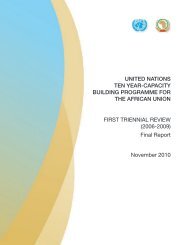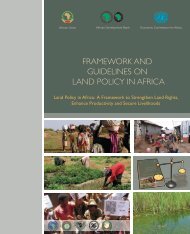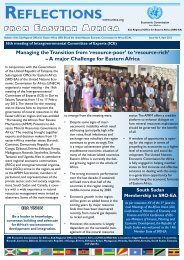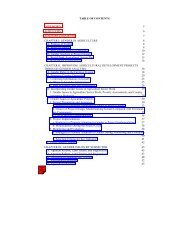A Decade of NEPAD - Economic Commission for Africa - uneca
A Decade of NEPAD - Economic Commission for Africa - uneca
A Decade of NEPAD - Economic Commission for Africa - uneca
Create successful ePaper yourself
Turn your PDF publications into a flip-book with our unique Google optimized e-Paper software.
8 A <strong>Decade</strong> <strong>of</strong> <strong>NEPAD</strong>: Deepening <strong>Africa</strong>n Private Sector and Civil Society Ownership and Partnership<br />
7% per annum <strong>for</strong> the next 15 years toward ensuring that<br />
<strong>Africa</strong> would be able to achieve the targets agreed to under<br />
the Millennium Development Goals (MDGs):<br />
ӹ The eradication <strong>of</strong> extreme poverty and hunger,<br />
ӹ Universal primary education,<br />
ӹ Gender equality and the empowerment <strong>of</strong> women,<br />
ӹ Reduction in child mortality,<br />
ӹ Improvement in maternal health,<br />
ӹ The reduction and greater prevention <strong>of</strong> HIV/AIDs,<br />
malaria and other diseases,<br />
ӹ Environmental sustainability, and<br />
ӹ The development <strong>of</strong> a global partnership <strong>for</strong><br />
development.<br />
The outcomes expected from the <strong>NEPAD</strong> programme<br />
include:<br />
ӹ reduced poverty and inequality,<br />
ӹ diversification <strong>of</strong> productive activities,<br />
ӹ enhanced international competitiveness and increased<br />
exports,<br />
ӹ increased <strong>Africa</strong>n integration, and<br />
ӹ increased employment, economic growth and<br />
development.<br />
<strong>NEPAD</strong> was also expected to mobilise implementation<br />
supporting resources by:<br />
ӹ Increasing domestic savings and investments;<br />
ӹ Improving management <strong>of</strong> public revenue and<br />
expenditure;<br />
ӹ Improving <strong>Africa</strong>’s share in global trade;<br />
ӹ Attracting <strong>for</strong>eign direct investment; and<br />
ӹ Increasing capital flows through further debt reduction<br />
and increase ODA flows.<br />
Strategically, it was intended that <strong>NEPAD</strong> would realise<br />
its aims through the promotion <strong>of</strong> policy re<strong>for</strong>ms and<br />
increased investment in the following priority sectors:<br />
ӹ Agriculture;<br />
ӹ Human development with a focus on health, education,<br />
science and technology and skills development;<br />
ӹ Building and improving infrastructure, including<br />
In<strong>for</strong>mation and Communications Technology (ICT),<br />
Energy, Transport, Water and Sanitation;<br />
ӹ Promoting diversification <strong>of</strong> production and exports,<br />
particularly with respect to agro-industries, manufacturing,<br />
mining, mineral beneficiation and tourism;<br />
ӹ Accelerating intra-<strong>Africa</strong>n trade and improving access<br />
to markets <strong>of</strong> developed countries;<br />
ӹ The environment.<br />
Lastly, toward achievement <strong>of</strong> the <strong>NEPAD</strong> aims, the key<br />
action areas under the Programme involved the following:<br />
ӹ Governance – The operationalisation <strong>of</strong> the <strong>Africa</strong>n<br />
Peer Review Mechanism;<br />
ӹ Infrastructure -Facilitation and support <strong>of</strong> the implementation<br />
<strong>of</strong> the short-term, medium and long term<br />
regional infrastructure programmes;<br />
ӹ Agriculture – Facilitation and implementation <strong>of</strong> the<br />
food security and agricultural development program<br />
in all sub-regions;<br />
ӹ Trade, Debt Relief and Improved Assistance – Facilitation<br />
<strong>of</strong> the preparation <strong>of</strong> a coordinated <strong>Africa</strong>n position<br />
on Market Access, debt relief and ODA re<strong>for</strong>ms;<br />
ӹ MDGs – Monitoring and intervention as appropriate<br />
toward ensuring that the Millennium Development<br />
Goals in the areas <strong>of</strong> health and education were met.<br />
Early Period<br />
Since its inception, <strong>NEPAD</strong> has experienced four eras <strong>of</strong><br />
leadership that have coloured the progress <strong>of</strong> the initiative<br />
and impacted upon how it has been received on the<br />
continent.







